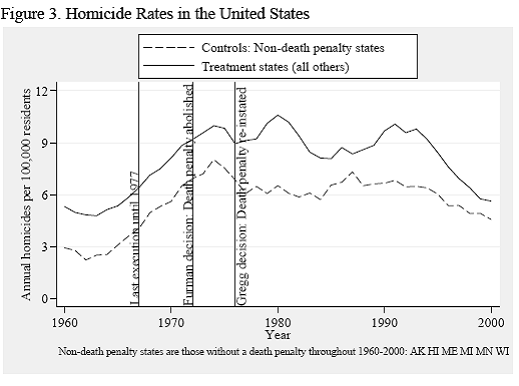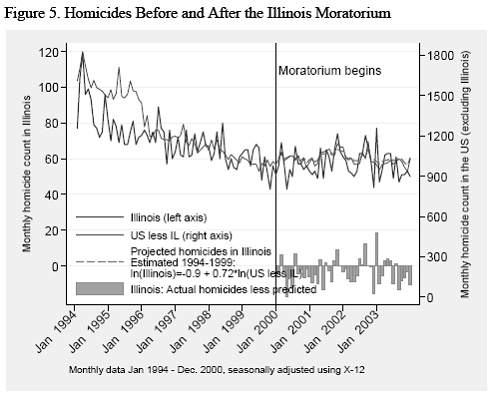Does the Death Penalty Deter?
I am thinking about this question because the death penalty is a topic of discussion on the campus where I teach. Generally, the programs designed to facilitate the discussion have been thoughtful and measured. However, a colleague of mine has posted some statistics on his door that purport to show the effectiveness of the death penalty as a deterrence. As is often the case with this colleague, he adopts a stance dogmatically, misuses or misinterprets the evidence, and arrogantly refuses to debate the issue openly preferring instead to make snarky remarks. I may respond by posting some data of my own on my door as a sort of snarky equipollence argument (i.e., equally weighted counterargument). However, the real work has already been done by people who know how to analyze the data. See this article in the Stanford Law Review for a detailed analysis, showing that the data is at best inconclusive and may even show the opposite.
In the meantime, check out these graphs.

This one shows that the homicide rates in states without a death penalty tracked those with a death penalty. Thus, the trends in homicide do not correlate to death penalty laws. Furthermore, it is interesting to note that the rates are lower in the states without the death penalty.

This one shows a decrease in homicides after the moratorium on capital punishment began. In fact, the bar graph shows even fewer homicides than one would expect given the national trend at that point.
None of this is conclusive by itself. However, the full study does conclusively show that the other major studies are flawed when they claim that the data supports the thesis that the death penalty is a deterrence. So stick that in your pipe, colleague!
In the meantime, check out these graphs.

This one shows that the homicide rates in states without a death penalty tracked those with a death penalty. Thus, the trends in homicide do not correlate to death penalty laws. Furthermore, it is interesting to note that the rates are lower in the states without the death penalty.

This one shows a decrease in homicides after the moratorium on capital punishment began. In fact, the bar graph shows even fewer homicides than one would expect given the national trend at that point.
None of this is conclusive by itself. However, the full study does conclusively show that the other major studies are flawed when they claim that the data supports the thesis that the death penalty is a deterrence. So stick that in your pipe, colleague!
